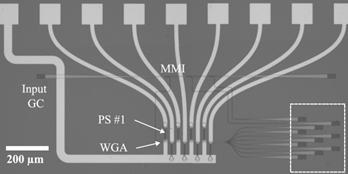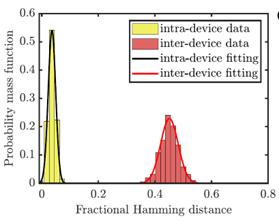Ensuring information security has become a major challenge today, driven by the rapid advancements in the Internet of Things (IoT) and artificial intelligence (AI). Physical Unclonable Functions (PUFs) have emerged as a promising hardware security solution by leveraging the physical variations that naturally occur during fabrication to create unique “fingerprint”. PUFs are easy to mass-produce, yet each one is inherently unique and prohibitively difficult to duplicate. As a result, PUFs have found applications in identification, authentication, and cryptographic random number generation. While electronic PUFs are widely deployed in the market, they are increasingly vulnerable to machine learning attacks. Silicon photonic PUFs, however, present a compelling alternative, offering enhanced security features over their electronic counterparts while maintaining compatibility with CMOS fabrication processes and chip-scale footprints.
In our group, we develop a silicon photonic PUFs that integrate both challenge generation and response detection on chips. Our goal is to create stand-alone PUF devices without relying on sophisticated light sources or external metrology tools.


Relevant Publications:
- G. Z. Yiu, C. Y. Hsu, C. H. Sun, P. Y. Chen, and Y. C. Chang, “Silicon photonic physical unclonable function based on waveguide array embedded with phase shifters,” Opt. Express 33(9), 19409–19417 (2025).
- G.Z. Yiu, C. Y. Hsu, C. H. Sun, P. Y. Chen, and Y. C. Chang, “Silicon Photonic Physical Unclonable Functions Based on an Actively-tuned Waveguide Array,” Conference on Lasers and Electro-Optics (CLEO), STh1K.5 (2024).
